Sept. 4, 2025
Publications
🌐follow Marie-Anne Frison-Roche sur LinkedIn
🌐subscribe to the Newsletter MAFR Regulation, Compliance, Law
🌐subscribe to the Video Newsletter MAFR Surplomb
____
► Full Reference: M.-A. Frison-Roche, "À quoi engagent les engagements" (In Compliance Law, the legal consequences for Entreprises of their commitments and undertakings), in M.-A. Frison-Roche (dir.), L'Obligation de Compliance, Journal of Regulation & Compliance (JoRC) and Lefebvre-Dalloz, coll. "Régulations & Compliance", 2025, forthcoming
____
📝read the article (in French)
____
🚧read the bilingual Working Paper on which this article is based, with additional developments, technical references and hyperlinks
____
📕real the general presentation of the book, L'Obligation de Compliance, in which this article is published
____
► English summary of this article: The innocents might believe, taking the Law and its words literally, that "commitments" are binding on those who make them. Shouldn't they be afraid of falling into the trap of the 'false friend', which is what the Law wants to protect them from (as stated in the prolegomena)?
Indeed, the innocent persons think that those who make commitments ask what they must do and say what they will do. Yet, strangely enough, the 'commitments' that are so frequent and common in compliance behaviours are often considered by those who adopt them to have no binding value! Doubtless because they come under disciplines other than Law, such as the art of Management or Ethics. It is both very important and sometimes difficult to distinguish between these different Orders - Management, Moral Norms and Law - because they are intertwined, but because their respective standards do not have the same scope, it is important to untangle this tangle. This potentially creates a great deal of insecurity for companies (I).
The legal certainty comes back when commitments take the form of contracts (II), which is becoming more common as companies contractualise their legal Compliance Obligations, thereby changing the nature of the resulting liability, with the contract retaining the imprint of the legal order or not having the same scope if this prerequisite is not present.
But the contours and distinctions are not so uncontested. In fact, the qualification of unilateral undertaking of will is proposed to apprehend the various documents issued by the companies, with the consequences which are attached to that, in particular the transformation of the company into a 'debtor', which would change the position of the stakeholders with regard to it (III).
It remains that the undertakings expressed by companies on so many important subjects cannot be ignored: they are facts (IV). It is as such that they must be legally considered. In this case, Civil Liability will have to deal with them if the company, in implementing what it says, what it writes and in the way it behaves, commits a fault or negligence that causes damage, not only the sole existence of an undertaking.
________
Sept. 4, 2025
Thesaurus : Doctrine

► Full Reference: J.-Ch. Roda "La preuve de la bonne exécution de la Vigilance au regard du système probatoire de Compliance (Proof that Vigilance has been properly carried out with regard to the Compliance evidence system)", in M.-A. Frison-Roche (ed.), L'Obligation de Compliance, Journal of Regulation & Compliance (JoRC) and Éditions Lefebvre - Dalloz, coll. "Régulations & Compliance", 2025, forthcoming.
____
📕read a general presentation of the book, L'Obligation de Compliance, in which this article is published
____
► English summary of this contribution : Taking the Duty of Vigilance as an illustration, the first part of the article examines the question of who must prove about that and in what order. There are no rules in the legal dispositions specific to the Vigilance Duty duty that expressly reverse the burden of proof, to the extent of placing it on the company that should demonstrate that it has correctly fulfilled its obligation. Instead, it is needed to return to general law, which makes the burden of proof vary according to the nature of the obligations incumbent on the company as a result of its Duty of Vigilance, in particular between simplly drawing up a plan and drawing it up such that its effectiveness can be expected to give rise to an obligation on those who dispute it to demonstrate its ineffectiveness. In any event, the 2 litigant parties immediately seek to fuel the debate with elements in their favour, whatever their position in the process.
This brings us to the second part of the article, devoted to the question of what constitutes proof of proper performance of the Vigilance Duty. Requiring proof of a positive fact and the constitution of a self-evidence of conformity would both be excessive and would distance the company from the Monumental Goals that are its compass. Instead, it is pertinent to distinguish between Compliance Structures, for which the proof requirements must be high, and Expected Compliance Actions, for which proof of efforts is sufficient, the obligation being only of means. In fact, companies will be wise to provide proof of their efforts as early as possible.
The third part therefore deals logically with the means of proof available to the parties. Claimants act on the principle of freedom of evidence and benefit from numerous sources of information, but the most serious difficulties arise when the facts to be proven are located outside the European Union. The company can establish that the plan has been implemented using various types of evidence, but it would appear that the standard of proof is high, even if the Vigilance Plan were to be regarded as an act of management.
________
🦉This article is available in full texte for people who follow Professor Marie-Anne Frison-Roche teaching
Sept. 4, 2025
Thesaurus : Doctrine

► Référence complète : Ch. Lapp, "L’usage de l’arbitrage international pour renforcer l’obligation de Compliance : l’exemple du secteur de la construction", in M.-A. Frison-Roche (dir.), L'Obligation de Compliance, Journal of Regulation & Compliance (JoRC) et Dalloz, coll. "Régulations & Compliance", 2025, sous presse.
____
📕lire une présentation générale de l'ouvrage, L'Obligation de Compliance, dans lequel cette contribution est publié
____
► Résumé de l'article (fait par le Journal of Regulation & Compliance - JoRC) : L'auteur souligne que l'arbitrage est un mode de résolution des litiges qui est particulièrement prégnant dans le secteur de la construction, non seulement parce que les opérateurs y recourent beaucoup mais parce que cette activité engendrent des difficultés qui se prêtent à l'arbitrage et dans le même temps concernent des questions de Compliance.
Pour produire la sécurité requise et prenant comme focus le plan de Vigilance, l'auteur examine la façon dont des litiges peuvent naître à propos de celui-ci et à propos de quoi. Au regard de cela, sont examinées d'une part les cas dans lesquels des arbitrages peuvent être organisés à côté de la compétence légalement attribuée au Tribunal judiciaire de Paris et d'autre part la façon dont les arbitres vont apporter des solutions aux difficultés qui leur sont soumises.
________
🦉Cet article est accessible en texte intégral pour les personnes inscrites aux enseignements de la Professeure Marie-Anne Frison-Roche
________
Sept. 4, 2025
Thesaurus : Doctrine

► Full Reference: Fr. Ancel, "Devoir de vigilance et litiges commerciaux : une compétence à partager ?" (Duty of Vigilance and commercial disputes: a jurisdictional competence shared ?), in M.-A. Frison-Roche (dir.), L'Obligation de Compliance, Journal of Regulation & Compliance (JoRC) and Lefebvre-Dalloz, coll. "Régulations & Compliance", 2025, forthcoming.
____
📕read the general presentation of the book, L'Obligation de Compliance, in which this contribution is published
____
► English summary of this contribution (done by the Journal of Regulation & Compliance - JoRC) : The author considers the procedural issues raised by the duty of vigilance as the "cutting edge" of Compliance Law. After recalling the obligations imposed by the French 2017 law so-called "Vigilance Law" with regard to the Vigilance Plan, he emphasises the 2 types of action instituted by the law to ensure compliance with the duty of vigilance: the preventive action to put an end to the unlawful act, initiated after the formal notice has been served, and the civil liability action that can be brought under the conditions of general tort law, once the damage has occurred.
It is the French 2021 law so-called "Confidence Law" that has targeted the Paris Judicial Court of First Instance, in a jurisdiction that can be described as 'special' rather than exclusive. The author looks in detail at the disputes that this law both puts an end to and yet triggers in its turn, going back over the case law of the French Cour de cassation, which referred to the very nature of the Vigilance Plan and the subject matter of the dispute. It is therefore clear that the dispute may concern only the validity of the plan, in which case the Paris Court of first instance has jurisdiction, or it may concern a dispute, for example, between the company that drew up the plan and one of its partners, in which case jurisdiction is shared.
The article details all the procedural situations involving disputes in which the Vigilance Plan is more or less at the centre, which more or less implies either a lack of jurisdiction, or a stay of proceedings, or knowledge of the entire dispute by a court other than the Paris Court àf first instance, with the author proposing methods each time to develop case law so that the Duty of Vigilance does not emerge fragmented, at the same time as other jurisdictions, for example the commercial courts, will be dealing with the duty of vigilance insofar as it interferes with actions relating to commercial companies, the Plan having a direct link with the management of these companies, with the new definition of the corporate purpose of companies and with the exercise of the power of management of companies. According to the author, this "judicial syncretism", expressed in the case law of the Cour de cassation, is part of Compliance Law, which goes beyond the distinction between the traditional branches of law.
To give concrete form to this general view, the author states that when the subject of the action is the legality or validity of the plan, it therefore falls within the jurisdiction specially conferred by law on the Paris Court of First Instance. However, when the plan is only mentioned in an ancillary manner, and/or the duty of vigilance is mentioned in another capacity, the natural jurisdiction of the case law remains, for example if the nullity of a contractual stipulation is alleged. It is possible that this type of dispute is more frequent and more important than actions based primarily on the illegality of the Vigilance Plan. This contractual dispute could also arise from the fact that the company contractually imposes compliance with its own Vigilance Obligation on its employees and partners as part of the "adapted actions".
Judges, for example commercial judges, are then justified in interpreting and applying Vigilance obligations in the spirit of the law, particularly with regard to the aims pursued. It will be important for a common approach to emerge.
________
🦉this article is fully available for people enrolled in courses taught by Professor Marie-Anne Frison-Roche
________
July 2, 2025
Conferences

🌐follow Marie-Anne Frison-Roche on LinkedIn
🌐subscribe to the Newsletter MAFR Regulation, Compliance, Law
🌐subscribe to the Video Newsletter MAFR Surplomb
🌐subscribe to the Newsletter MaFR Droit & Art
____
► Full Reference: M.-A. Frison-Roche, "L'enjeu de la crédibilité des rapports de durabilité. Temps long, Simplicité et Stratégie" (The credibility of sustainability reports. Time, Simplicity and Strategy), concluding speech, in Rencontres de la Haute Autorité de l'Audit (H2A), 2025, Mise en œuvre de la directive CSRD. Premiers constats et perspectives (Annual Manifestation of the French Audit Regulatory Body Haute Autorité de l'Audit - H2A, Implementation of the CSRD directive. Initial findings and outlook),, 2 July 2025, La Défense, 1pm-6pm
____
This manifestation, which takes place face-to-face with simultaneous translation, begins with a presentation by Florence Peybernès, President of the French High Audit Authority ( Haute Autorité de l'Audit -H2A).
It is followed by 3 round-table discussions:
🪑🪑🪑 Round table 1: Feedback on the first appointments
🪑🪑🪑 Round table 2: Cross-perspectives between preparers, verifiers and stakeholders
🪑🪑🪑 Round table 3: Perspectives for CSRD
It is following on from this that the more legal, more judicial perspective, in an articulation between Ex Ante and Ex Post, will take shape.
____
► English summary of the speech, as prepared : n view of the information available at the time of preparation for this event, the considerable interest aroused by the CSRD, and also its contestation, which led to its modification, is it counter-intuitive in view of the technicality of the remarks, the flood of criticism and the number of pages one reads, the impression of the weight, constraints and uselessness of the thing which would deprive companies of their freedom, but what emerges rather is Simplicity. Why: because the sustainability report is only a tool and it is the goal it serves that needs to be considered (more generally that's how the judge looks at it), a tool that serves a European strategy (Green Deal, sustainable finance). It is this strategy that needs to be identified, and the company has a free hand in it. What we are looking at the company in its contribution to this goal that is simple, a contribution which it can, in information that is admittedly standardised, draw the outlines of
Long-term and Strategy: Investors and stakeholders are not hostile to this approach: the key is the credibility of the information made available. Because Long-Term Thinking puts the future at the centre, and we don't know what that future will be. This essential element, which the courts have recalled in relation to Vigilance Obligation, must also be borne in mind, because it is first and foremost a question of providing information about the future.
To express the Information they want to give on this subject, companies need to understand the Goal of the European Plan (where Simplicity lies), to adjust their own plan to it (under the more familiar term of "Strategy") the councils and lawyers need to help them with this; to blend their strategies with the European strategy, to rely on the authorities and the auditors so that what they say is credible. Credibility is at the heart of it, which is why auditors are at the heart of it.
Because the only obligation they have is to say. Not to do. The CSRD should not be interpreted as imposing obligations on the companies subject to it to do things (such as the obligation of vigilance generates); the CSRD only imposes an obligation on them to say things. The CSRD imposes on them only an obligation to inform. While this may be onerous, standardised and certified, there is no obligation to do or disclose anything. Moreover, that is part of the company's own strategy, a strategy over which the company retains full control. In this respect, although standardised, the information is free and it is the credibility of the information that is crucial, but not participation in a plan whose terms would be written by the Authorities or the stakeholders.
Therefore, after learning from each other, it seems that there are three fairly simple things that are sometimes buried under the complication of the details accumulated and the violence of the arguments exchanged around the European Omnibus package. These three points will be developed at the end of the round-tables.
The first is the simplicity of the breadcrumb trail of credible, accessible information imposed by the European Union to put the Green Deal into practice. This breadcrumb trail is held in particular by the various regulators.
The second is the existence of a single, simple obligation on the part of the company: to say what it has done, is doing and plans to do, without being obliged to do anything in the European Action Plan (the CRSD does not forcibly enroll companies in the European action plan). This limitation to an obligation to say is essential. Its articulation with obligations to act, arising in particular from texts on Vigilance, or even identical terms, must not lead to confusion in qualifications.
The third is the benefit that the company derives from the articulation of a double "singular strategy": that of the European Union, which wants to build its future, a strategy of the Union to which it is free to contribute or not to contribute, and that of its own strategy which is articulated with the first and in which green gives way to many other colours according to the will of the company.
► English Summary of speech, as made with regard to what effectively was said during the 2 round tables: During the event itself, I preferred to place myself rather in the direct continuation of what had been said. In the fifteen minutes allotted, this was the reason for not proceeding in this way, but rather to highlight the fact that what has emerged, all these efforts, uncertainty, trial and error and goodwill to elaborate that went into drawing up the first sustainability reports, runs the risk of being erased because in retrospect, in 2 or 5 years' time, particularly if a lawsuit were be brought, we will have the impression that everything was self-evident, that we knew everything, that everything was clear and decided. And it's that future, which will be the future of the judge who will be called upon by a stakeholder, a regulator, a prosecutor, who always takes the past for granted, that we have to think about. We need to think in terms of evidence. Evidence of uncertainty. And always remember that the sustainability report is also a piece of evidence. Which will fuel liability claims, disputes over information, and so on.
Plus encore, parce que le report de durabilité n'est qu'un outil, pour une stratégie, qui est une stratégie d'ensemble, où la CSRD n'est qu'un élément du puzzle, des éléments du rapport de durabilité peuvent être pris pour être utilisés plus tard pour alimenter d'autres documents et rapports, et d'autres litiges. Cela est notamment le cas du plan de vigilance, puisque la cartographie des risques est souvent commune au rapport de durabilité et au plan de vigilance, ce qui est logique puisque la CSRD et la CS3D se font miroir dans le grand plan d'action de l'Union que constitue le Pacte vert. Mais cela est amplifié par les entreprises, qui parfois confondent l'un et l'autre, dans la présentation même au sein du rapport de gestion. Il est pourtant essentielle de distinguer nettement l'obligation de dire (rapport de durabilité) et l'obligation de faire (plan de vigilance). L'ambiguïté des "engagements" accroît cela. Il est essentiel de veiller à un travail ex ante entre expert de la gestion, de la finance, de l'audit et du droit pour éviter que les points de contact ne se transforment en confusions, maintenant et /ou plus tard, confusions qui pourraient être préjudiciables à tous.
________

June 19, 2025
Thesaurus : Doctrine
► Référence complète : L. Rapp, "Équilibres instables. L'office du juge à l'épreuve du devoir de vigilance", AJDA, 2025, Etude, n01074.
____
🦉Cet article est accessible en texte intégral pour les personnes inscrites aux enseignements de la Professeure Marie-Anne Frison-Roche
________
June 17, 2025
Thesaurus : 08. Juridictions du fond
► Référence complète : Paris, pôle 5, ch. 12, 17 juin 2025, RG n° 24-05193, S.A. La Poste
____
________

Updated: Feb. 25, 2025 (Initial publication: Nov. 8, 2023)
Publications

🌐follow Marie-Anne Frison-Roche sur LinkedIn
🌐subscribe to the Newsletter MAFR Regulation, Compliance, Law
🌐subscribe to the Video Newsletter MAFR Surplomb / Overhang
____
 ► Full Reference: M.-A. Frison-Roche, Vigilance, the cutting edge and a full part of the Compliance Obligation, Working Paper, November 2023
► Full Reference: M.-A. Frison-Roche, Vigilance, the cutting edge and a full part of the Compliance Obligation, Working Paper, November 2023
____
📝 This Working Paper is the basis of the article, "La Vigilance, pointe avancée et part totale de l'Obligation de Compliance" (Vigilance, the cutting edge and a full part of the Compliance Obligation), published in 📕L'Obligation de Compliance
____
► Summary of this Working Paper: The "duty of vigilance" unleashes all the more radical and passionate positions, sometimes among Law professors, because it has not been precisely defined. One word is used for another, either inadvertently or deliberately, deliberately if it can attract this or that element from one legal corpus and import it into another. The very exercise of definition is therefore required in practice. There are specific obligations of vigilance that come under such and such a body of regulations and are imposed on such and such a category of operators to fulfill such and such a function. These are precise circles which are not confused and must not be confused. This is superimposed on what the French 2017 law so-called "Vigilance law", which is much more encompassing since it applies to all large companies in the operation of the value chains they have set up. The European 2024 directive is in the same way. But there is no general duty or obligation of Vigilance. Such a claim would be based on confusing or shifting each of these 3 levels, which must be avoided because no positive law does support this (I).
If the duty of vigilance is attracting so much attention, whether or not the European CS3D is fully effective, it is because Vigilance is the "cutting edge" of Compliance Obligation (II). Vigilance requires companies, by consideration of their power and without reproaching them for it or demanding that it be reduced, to detect risks of damage to the environment and climate, but also to human rights, because they are in a position to do so in order to prevent them from turning into disasters. In this respect, the Vigilance duty makes clearer the exact legal nature of the Compliance Obligation.
Moreover, Vigilance appears as the Total Part of the Compliance Obligation (III). Indeed, although it is restricted to one area, the value chain, and to two types of risk, deterioration of the environment and deterioration of human rights, it expresses the totality of the Compliance Obligation by means of tools that the 2017 French "Vigilance law" had itself duplicated from the 2016 so-called "Sapin 2 law": to preserve systems today, but above all tomorrow, in order they do not collapse (Negative Monumental Goals), or even consolidate them (Positive Monumental Goals), so that the human beings who are willingly or unwillingly involved in them are not crushed by them but benefit from them. This is why large companies are subject to the Obligation of Compliance and Vigilance, particularly in the humanist conception that Europe is developing.
The result is a new type of Litigation, of a systemic nature, for which the Courts have spontaneously become specialised, and for which the procedures will have to be adapted and the office of the Judge shall have to evolve.
_____
🔓read the developments below⤵️

Jan. 8, 2025
Publications

🌐follow Marie-Anne Frison-Roche sur LinkedIn
🌐subscribe to the Newsletter MAFR Regulation, Compliance, Law
🌐subscribe to the Video Newsletter MAFR Surplomb
____
 ► Full Reference: M.-A. Frison-Roche, Identifying and anticipating the practice of Emerging Systemic Litigation: a necessity for organizing it , Working Paper, December 2024.
► Full Reference: M.-A. Frison-Roche, Identifying and anticipating the practice of Emerging Systemic Litigation: a necessity for organizing it , Working Paper, December 2024.
____
🎤This working paper was drawn up to serve as the basis for the speech that opened the colloquium L’expérience des juridictions dans le Contentieux Systémique Émergent, in the cycle of conferences-debates "Contentieux Systémique Émergent," which was held in French on 16 December 2024 at the Paris Court of Appeal.
____
📝It will also constitute the basis of the first contribution to the book to be published in French in 2025, Le contentieux systémique émergent (Emerging Systemic Litigation).
____
► Summary of this Working Paper : Systemic Litigation is for the moment a practice that has not been clearly identified. This is a handicap in practice, firstly because it can be confused with other things, such as the "systemic method" that this category of Litigation calls for and to which it cannot be reduced and which this method exceeds, and secondly because if this practice is not conceptualised, secondly, because if this practice is not conceptualised, even if only by a shared definition, it is difficult for the courts to organise themselves and for the potential parties to the dispute and to the proceedings to anticipate the procedural and substantive solutions that will be adopted tomorrow. The difficulty is compounded by the fact that not all emerging disputes are Systemic and not all systemic disputes are emerging. For example, banking regulation litigation and litigation concerning the operation of competitive markets or sectoral regulation are systemic disputes that are not emerging. But it so happens that technological developments have given rise to new systemic litigation, which the courts, judges and parties have had to adapt to because the systems themselves are entering the courthouses.
A series of conferences has been organised to report on this practice, focusing on technology, legislation, management, court organisation, procedure and the role of the judge.
They have thus made it possible to build up common, cross-disciplinary knowledge so that innovations can be developed and expressed in the organisation of the courts, in procedures, particularly in the relationship between judges and lawyers, and in the openness of proceedings, in the conception of the judge's office, which must be singular when the case, because a systemic is implied, is systemic. This specificity leads to judges who are less hierarchical among themselves and more specialised, leading to procedural forms that place dialogue and adversarial proceedings no longer as a desire and support but as the primary guiding principle.
____
🔓read the developments of this Working Paper below⤵️
Nov. 18, 2024
Conferences

🌐follow Marie-Anne Frison-Roche on LinkedIn
🌐subscribe to the Newsletter MAFR Regulation, Compliance, Law
🌐subscribe to the Newsletter Surplomb, par MAFR
____
► Full Reference: M.-A. Frison-Roche, "Les spécificités à concevoir dans l'audience publique des contentieux systémiques de vigilance" ("The Specific Features of Public Hearings to conceive on Vigilance Systemic Litigation"), in Le Droit processuel de la Vigilance (Vigilance General Procedural Law), in cycle of conference-debates "Contentieux Systémique Émergent" ("Emerging Systemic Litigation"), organised on the initiative of the Cour d'appel de Paris (Paris Cour of Appeal), with the Cour de cassation (French Court of cassation), the Cour d'appel de Versailles (Versailles Court of Appeal), the École nationale de la magistrature - ENM (French National School for the Judiciary) and the École de formation des barreaux du ressort de la Cour d'appel de Paris - EFB (Paris Bar School), under the scientific direction of Marie-Anne Frison-Roche, November 18, 2024, 11h-12h30, Cour d'appel de Paris, Cassin courtroom
____
🕴️An other speaker to this conference is Natalie Fricero, Emeritus Professor at Côte d'Azur University
🧮see the full programme of this event
____
⚙️This event was conceived as part of the "Emerging Systemic Litigation" cycle of conference-debates, organized by the Paris Court of appeal, in conjunction with the French Court of cassation, the Versailles Court of appeal, the French National School for the Judiciary and the Paris Bar School, under the scientific direction of Marie-Anne Frison-Roche.
____
► English Summary of the conference:
________

Nov. 18, 2024
Organization of scientific events
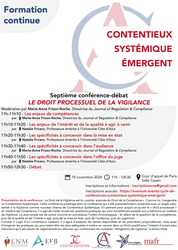
► Full Reference: Le Droit processuel de la Vigilance (Vigilance General Procedural Law), in cycle of conference-debates "Contentieux Systémique Émergent" ("Emerging Systemic Litigation"), organised on the initiative of the Cour d'appel de Paris (Paris Cour of Appeal), with the Cour de cassation (French Court of cassation), the Cour d'appel de Versailles (Versailles Court of Appeal), the École nationale de la magistrature - ENM (French National School for the Judiciary) and the École de formation des barreaux du ressort de la Cour d'appel de Paris - EFB (Paris Bar School), under the scientific direction of Marie-Anne Frison-Roche, November 18, 2024, 11h-12h30, Cour d'appel de Paris, Cassin courtroom
____
► Presentation of the conférence:
____
🧮Programme of this event:
Seventh conference-debate
LE DROIT PROCESSUEL DE LA VIGILANCE
(VIGILANCE GENERAL PROCEDURAL LAW)
Paris Court of Appeal, Cassin courtroom
Presentation and moderation par Marie-Anne Frison-Roche, Professor of Regulatory and Compliance Law, Director ot the Journal of Regulation & Compliance (JoRC)
🕰️11h-11h20. 🎤, by 🕴️Marie-Anne Frison-Roche, Professor of Regulatory and Compliance Law, Director ot the Journal of Regulation & Compliance (JoRC)
🕰️11h20-11h40. 🎤, by 🕴️Natalie Fricero, Emeritus Professor of Law at Côte d'Azur University
🕰️11h40-12h30. Debate
____
🔴Registrations and information requests can be sent to: inscriptionscse@gmail.com
🔴For the attorneys, registrations have to be sent to the following address: https://evenium.events/cycle-de-conferences-contentieux-systemique-emergent/
⚠️The conference-debates are held in person only, in the Cour d’appel de Paris (Paris Court of Appeal).
________
Nov. 18, 2024
Conferences

🌐follow Marie-Anne Frison-Roche on LinkedIn
🌐subscribe to the Newsletter MAFR Regulation, Compliance, Law
🌐subscribe to the Newsletter Surplomb, par MAFR
____
► Full Reference: M.-A. Frison-Roche, "Choix et embranchements de compétences lorsqu'un enjeu de vigilance est allégué" ("Choice and Branching of Jurisdiction when a Vigilance issue is Alleged"), in Le Droit processuel de la Vigilance (Vigilance General Procedural Law), in cycle of conference-debates "Contentieux Systémique Émergent" ("Emerging Systemic Litigation"), organised on the initiative of the Cour d'appel de Paris (Paris Cour of Appeal), with the Cour de cassation (French Court of cassation), the Cour d'appel de Versailles (Versailles Court of Appeal), the École nationale de la magistrature - ENM (French National School for the Judiciary) and the École de formation des barreaux du ressort de la Cour d'appel de Paris - EFB (Paris Bar School), under the scientific direction of Marie-Anne Frison-Roche, November 18, 2024, 11h-12h30, Cour d'appel de Paris, Cassin courtroom
____
🕴️An other speaker to this conference is Natalie Fricero, Emeritus Professor at Côte d'Azur University
🧮see the full programme of this event
____
⚙️This event was conceived as part of the "Emerging Systemic Litigation" cycle of conference-debates, organized by the Paris Court of appeal, in conjunction with the French Court of cassation, the Versailles Court of appeal, the French National School for the Judiciary and the Paris Bar School, under the scientific direction of Marie-Anne Frison-Roche.
____
► English Summary of the conference: This speech opens the conference. It therefore logically focuses on the question of "jurisdictional competence". It is divided into successive points which are progressively linked to each other.
The first point consists to insist on this rule : the organisation of the courts and their jurisdiction can never be detached from the substance of the matter in dispute. This explains why the issue of jurisdiction is such a source of passion for as long as the very definition of Vigilance remains so contentious, and why the 2021 legislature's belief that it could put out the fire has only served to exacerbate it.
The second point relates to the first proposed solution, i.e. maintaining the exclusivity of the Paris First Judicial Court, which is acceptable in principle because by specialising judges acquire a "technical competence" but which presents a very damaging "Bibendum risk".
The third point relates to the second solution proposed, namely the reference to the Motulskian notion of the 'basis of demand', which provokes a fork in the road, with the risk of interminable conflicts and divergent interpretations.
The fourth point is the need to find the best solution, i.e. the least bad solution, consisting above all of forming practical alliances, without requiring new texts, for this particular type of litigation which does not come under any branch of Law and which justifies a dialogue between the heads of the courts.
____
🔓read the key points of this speech below ⤵️
________
Oct. 21, 2024
Thesaurus : Doctrine
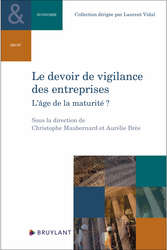
► Référence complète : Ch. Maubernard & A. Brès (dir.), Le devoir de vigilance des entreprises. L'âge de la maturité ?, Bruxelles, Bruylant, coll. "Droit & Économie", 258 p.
____
____
📗lire le sommaire de l'ouvrage
____
📗lire la table des matières de l'ouvrage
____
► Présentation de l'ouvrage (fait par l'éditeur) : "L’adoption par le Parlement européen et le Conseil le 13 juin 2024 de la directive (UE) 2024/1760 sur le devoir de vigilance des entreprises en matière de durabilité constitue une étape décisive dans la prise en compte de la responsabilité sociétale des entreprises. Cette nouvelle législation européenne imposera aux entreprises qui entrent dans son champ d’application et qui agissent au sein du marché intérieur, y compris les entreprises étrangères, de se doter d’outils de vigilance afin de mettre un terme ou à tout le moins de limiter les incidences négatives que pourraient avoir leurs activités et celles de leurs partenaires sur la protection des droits de l’homme, de l’environnement et désormais de la lutte contre le changement climatique.
C’est à la suite de la proposition de la Commission européenne visant à faire adopter ce texte, qu’un colloque a été organisé à la Faculté de Droit et de Science politique de Montpellier en mai 2023. L’ouvrage est le résultat de ces fructueux échanges qui ont permis à d’éminents spécialistes, tant universitaires que de la vie des affaires et du monde associatif, de réfléchir aux incidences de cette nouvelle législation. Cet éclairage pluridisciplinaire a permis, en effet, de s’interroger sur l’articulation de la législation de l’Union européenne avec les législations nationales existantes (et en premier lieu la loi française de 2017) mais aussi, plus largement, sur le sens du devoir de vigilance.
L’ouvrage s’adresse ainsi aussi bien aux chercheurs intéressés par ces questions, qu’aux étudiants de Master et aux professionnels du Droit qui seront en première ligne pour accompagner les entreprises soumises au devoir de vigilance à se conformer à leurs obligations nouvelles.".
____
📝consulter une présentation de l'article de Marie-Anne Frison-Roche : "Devoir de vigilance : progresser"
________
Oct. 21, 2024
Publications

🌐follow Marie-Anne Frison-Roche on LinkedIn
🌐subscribe to the Newsletter MAFR. Regulation, Compliance, Law
🌐s'abonner à la Newsletter Surplomb, par MAFR
____
► Full Reference: M.-A. Frison-Roche, "Devoir de vigilance : progresser" ("Duty of Vigilance: the Way Forward"), in Ch. Maubernard & A. Brès (eds.), Le devoir de vigilance des entreprises. L'âge de la maturité ? (The duty of vigilance. The age of maturity?), Bruylant, "Droit & Economie" Serie, 2024, pp. 221-251
____
📝read the article (in French)
____
🚧 read the bilingual Working Paper which is the basis of this article, with additional developments, technical references and hyperlinks
____
► English Summary of the article: In 2017 in France the so-called Vigilance law expressed great ambition. So did the draft directive. But in 2024 the European institutions moderated this ambition by refusing to increase either the type of companies subject and the constraints to which the duty of vigilance is associated. The directive has essentially halted what was for some the "march of progress". Does the ambition no longer exist? Does the future lie in an extension of the philosophy of the duty of vigilance, i.e. companies that should always be more concerned about others? This would undoubtedly be reaching the "age of maturity", where others see the age of madness, because it would be a contradiction in terms to ask a company to be concerned about anything other than its own development.
It is therefore appropriate to consider this very hypothesis of an "age of maturity" as being an ambition maintained despite a European directive which, in its adopted version, is weakened and while the oppositions are intact (I). First of all, it must be admitted that the notion of "maturity" most often conceals a value judgment when applied to a legal concept (I.A.) and that this is blatantly obvious with regard to the duty of vigilance, which is considered by some and by nature by some as a good and by others as an evil (I.B).
In order not to remain in what appears to be trench warfare, we must not get too bogged down in the reference French legislation of 2017 and what appears to be a European stutter in 2024, arguing so loudly that we can hear them reasoning in print, by paying attention to less visible and now more promising avenues of progress (II). In fact, the duty of vigilance can progress simply by the passage of time (II.A), by a better definition of the vocabulary (II.B), by the consolidation of the principles of Responsibility and Dialogue (II.C), by the uniqueness of the jurisdictional route (II.D).
This last perspective of the progress that will be made possible in France by the uniqueness of the judicial route leads to a final avenue of progress. By their very nature, laws are jolts, all the more violent for being disputed. At the moment, if we want to make progress, these two other sources - the contract and the judge - must be favoured (III). The European directive is rightly concerned with access to the courts and takes a measured view of the effectiveness of contracts as a means of making the duty of vigilance effective, with the courts having to ensure that the contract does not destroy the spirit of the system. This is what the law already organises about the relationship between the contract, the judge and the duty of compliance (III.A). What is new in Europe in 2024 is the introduction of a Supervisor (III.B). Here again, vigilance is the "cutting edge" of Compliance Law, as it is an extension of Regulatory Law.
The result is that, through interpretation and the handling of principles, and to formulate a more general conclusion, it is the judge who holds and will hold the balance of the duty of vigilance.
________

Sept. 25, 2024
Organization of scientific events
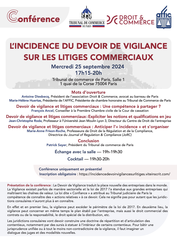
🌐follow Marie-Anne Frison-Roche on LinkedIn
🌐subscribe to the Newsletter MAFR Regulation, Compliance, Law
____
► Full Reference: M.-A. Frison-Roche, coordination of the conference L'incidence du devoir de vigilance sur les litiges commerciaux (The impact of the duty of vigilance on commercial litigation), Tribunal de commerce de Paris (Paris Commercial Court), Droit & Commerce and Association Française en Faveur de l'Institution Consulaire (AFFIC), Tribunal de commerce de Paris, 25 September 2024, 5.15p.m. to 8p.m.
____
🧮see the full programme of this event
____
🌐consult on LinkedIn a general présentation of this event (in French)
____
► General presentation of the conference: The Duty of Vigilance reflects the new role of firms in the world. Vigilance sometimes existed on a sectoral basis, but the 2017 French law extended it to large companies that control value chains. The French so-called "confiance" law gave the Tribunal judiciaire de Paris (Paris First Instance Civil Court) jurisdiction to hear "actions relatives" ("actions relating") to this duty. This does not mean, however, that the commercial courts will no longer have jurisdiction.
Firstly, vigilance may go beyond the scope of the 2017 French law. Secondly, vigilance may concern not only the plan drawn up by the firm, but also Commercial Contract Law or Liability Law, special Distribution Law, etc.
Commercial courts will have to develop a doctrine for dividing up and coordinating disputes, in particular by staying proceedings within certain disputes. To build a unified or at least non-contradictory case law on vigilance, we need to imagine a dialogue between judges and new procedures.
____
🧮Programme of this event:
L'INCIDENCE DU DEVOIR DE VIGILANCE SUR LES LITIGES COMMERCIAUX
(THE IMPACT OF THE DUTY OF VIGILANCE ON COMMERCIAL LITIGATION)
Paris First Instance Commercial Court, room 1
🕰️5.15pm.-5.30pm. Welcome
🕰️5.30pm.-5.40pm. 🎤Mots d'ouverture (Opening words), by 🕴️Antoine Diesbecq, President of Droit & Commerce, attorney at the Paris Bar and 🕴️Marie-Hélène Huertas, President of AFFIC, Honorary President of Chamber of the Paris First Instance Commercial Court
🕰️5.40pm.-6pm. 🎤Devoir de vigilance et litiges commerciaux : Une compétence à partager ? (Duty of Vigilance and Commercial Litigation: A jurisdiction to share?), by 🕴️François Ancel, Judge at the Première Chambre civile de la Cour de cassation (First Civil Chamber of the French Court of cassation)
🕰️6pm.-6.20pm. 🎤Devoir de vigilance et litiges commerciaux : Expliciter les notions et qualifications en jeu (Duty of Vigilance and Commercial Litigation: Explain the concepts and qualifications involved?), by 🕴️Jean-Christophe Roda, Full Professor at Jean Moulin Lyon 3 University, Director of the Centre de Droit de l’entreprise
🕰️6.20pm.-6.40pm. 🎤Devoir de vigilance et litiges commerciaux : Anticiper l''incidence" et s’organiser (Duty of Vigilance and Commercial Litigation: Anticipating the "impact" and getting organised), by 🕴️Marie-Anne Frison-Roche, Professor of Regulatory Law and Compliance Law, Director of the Journal of Regulation & Compliance (JoRC)
🕰️6.40pm.-7pm. 🎤Conclusion (Conclusion), by 🕴️Patrick Sayer, President of the Tribunal de commerce de Paris (Paris First Instance Commercial Court)
🕰️7pm.-7.30pm. Discussion with the audience
🕰️7.30pm.-8pm. Cocktail
________

Updated: July 8, 2024 (Initial publication: Dec. 15, 2023)
Publications

🌐follow Marie-Anne Frison-Roche on LinkedIn
🌐subscribe to the Newsletter MAFR Regulation, Compliance, Law
____
 ► Full Reference: M.-A. Frison-Roche, Duty of vigilance: the way forward, Working Paper, December 2023/July 2024.
► Full Reference: M.-A. Frison-Roche, Duty of vigilance: the way forward, Working Paper, December 2023/July 2024.
____
🎤 This working paper has been drawn up to serve as a basis for the conclusions of the colloquium Le devoir de vigilance: l'âge de la maturité? ("The duty of vigilance: the age of maturity?") organised by the University of Montpellier on 25 May 2023.
_____
📝 Updated and developed, it serves as the basis for the article that concludes the book Le devoir de vigilance des entreprises : l'âge de la maturité? ("The duty of vigilance: the age of maturity?"), Editions Bruylant, 2024.
____
► Working Paper summary: In 2017 in France the so-called Vigilance law expressed great ambition. So did the draft directive. But in 2024 the European institutions moderated this ambition by refusing to increase either the type of companies subject and the constraints to which the duty of vigilance is associated. The directive has essentially halted what was for some the "march of progress". Does the ambition no longer exist? Does the future lie in an extension of the philosophy of the duty of vigilance, i.e. companies that should always be more concerned about others? This would undoubtedly be reaching the "age of maturity", where others see the age of madness, because it would be a contradiction in terms to ask a company to be concerned about anything other than its own development.
It is therefore appropriate to consider this very hypothesis of an "age of maturity" as being an ambition maintained despite a European directive which, in its adopted version, is weakened and while the oppositions are intact (I). First of all, it must be admitted that the notion of "maturity" most often conceals a value judgment when applied to a legal concept (I.A.) and that this is blatantly obvious with regard to the duty of vigilance, which is considered by some and by nature by some as a good and by others as an evil (I.B).
In order not to remain in what appears to be trench warfare, we must not get too bogged down in the reference French legislation of 2017 and what appears to be a European stutter in 2024, arguing so loudly that we can hear them reasoning in print, by paying attention to less visible and now more promising avenues of progress (II). In fact, the duty of vigilance can progress simply by the passage of time (II.A), by a better definition of the vocabulary (II.B), by the consolidation of the principles of Responsibility and Dialogue (II.C), by the uniqueness of the jurisdictional route (II.D).
This last perspective of the progress that will be made possible in France by the uniqueness of the judicial route leads to a final avenue of progress. By their very nature, laws are jolts, all the more violent for being disputed. At the moment, if we want to make progress, these two other sources - the contract and the judge - must be favoured (III). The European directive is rightly concerned with access to the courts and takes a measured view of the effectiveness of contracts as a means of making the duty of vigilance effective, with the courts having to ensure that the contract does not destroy the spirit of the system. This is what the law already organises about the relationship between the contract, the judge and the duty of compliance (III.A). What is new in Europe in 2024 is the introduction of a Supervisor (III.B). Here again, vigilance is the "cutting edge" of Compliance Law, as it is an extension of Regulatory Law.
The result is that, through interpretation and the handling of principles, and to formulate a more general conclusion, it is the judge who holds and will hold the balance of the duty of vigilance.
____
🔓read the Working Paper below⤵️

June 20, 2024
Publications

🌐follow Marie-Anne Frison-Roche on LinkedIn
🌐subscribe to the Newsletter MAFR Regulation, Compliance, Law
🌐subscribe to the Video Newsletter MAFR Surplomb
____
 ► Full Reference: M.-A. Frison-Roche, The will, the heart and the calculation, the three traits encercling the Compliance Obligation, March 2024.
► Full Reference: M.-A. Frison-Roche, The will, the heart and the calculation, the three traits encercling the Compliance Obligation, March 2024.
____
📝 This Working Paper is the basis for the contribution "The will, the heart and the calculation, the three traits encercling the Compliance Obligation", in📘Compliance Obligation.
____
► Summary of this Working Paper: There is often a dispute over the pertinent definition of Compliance Law, but the scale and force of the resulting obligation for the companies subject to it is clear. It remains difficult to define. First, we must not to be overwhelmed by the many obligations through which the Compliance Obligation takes shape, such as the obligation to map, to investigate, to be vigilant, to sanction, to educate, to collaborate, and so on. Not only this obligations list is very long, it is also open-ended, with companies themselves and judges adding to it as and when companies, sectors and cases require.
Nor should we be led astray by the distance that can be drawn between the contours of this Compliance Obligation, which can be as much a matter of will, a generous feeling for a close or distant other in space or time, or the result of a calculation. This plurality does not pose a problem if we do not concentrate all our efforts on distinguishing these secondary obligations from one another but on measuring what they are the implementation of, this Compliance Obligation which ensures that entities, companies, stakeholders and public authorities, contribute to achieving the Goals targeted by Compliance Law, Monumental Goals which give unity to the Compliance Obligation. Thus unified by the same spirit, the implementation of all these secondary obligations, which seem at once disparate, innumerable and often mechanical, find unity in their regime and the way in which Regulators and Judges must control, sanction and extend them, since the Compliance Obligation breathes a common spirit into them.
In the same way that the multiplicity of compliance techniques must not mask the uniqueness of the Compliance Obligation, the multiplicity of sources must not produce a similar screen. Indeed, the Legislator has often issued a prescription, an order with which companies must comply, Compliance then often being perceived as required obedience. But the company itself expresses a will that is autonomous from that of the Legislator, the vocabulary of self-regulation and/or ethics being used in this perspective, because it affirms that it devotes forces to taking into consideration the situation of others when it would not be compelled to do so, but that it does so nonetheless because it cares about them. However, the management of reputational risks and the value of bonds of trust, or a suspicious reading of managerial choices, lead us to say that all this is merely a calculation.
Thus, the contribution sets out to identify the Compliance Obligation by recognising the role of all these different sources. It emphasises that, in monitoring the proper performance of technical compliance obligations by Managers, Regulators and Judges, insofar as they implement the Compliance Obligation, it is pointless to limit oneself to a single source or to rank them abruptly in order of importance. The Compliance Obligation is part of the very definition of Compliance Law, built on the political ambition to achieve these Monumental Goals of preserving systems - banking, financial, energy, digital, etc. - in the future, so that human beings who cannot but depend on them are not crushed by them, or even benefit from them. This is the teleological yardstick by which the Compliance Obligation is measured, and with it all the secondary obligations that give it concrete form, whatever their source and whatever the reason why the initial standard was adopted.
In order to define Compliance's Obligation, the contribution endeavours to recognise the contribution of all these three sources: Will, Heart and Calculation.
_____
🔓read the developments below ⤵️
June 18, 2024
Thesaurus : 08. Juridictions du fond
► Référence complète : Cour d'appel de Paris, Pôle 5, Chambre 12, 18 juin 2024, n° RG 23/10583, Suez
____
____
🏛️consulter une présentation de l'arrêt rendu le même jour dans l'affaire dite TotalEnergies
____
🏛️consulter une présentation de l'arrêt rendu le même jour dans l'affaire dite EDF
____
📰lire le communiqué de presse accompagnant le prononcé de ces trois arrêts
____
📝Commentaires de cette décision :
- Rev. int. compliance, n°4, 30 juillet 2024, act. 135
________
June 18, 2024
Thesaurus : 08. Juridictions du fond
► Référence complète : Cour d'appel de Paris, Pôle 5, Chambre 12, 18 juin 2024, n° RG 21/22319, EDF
____
____
🏛️consulter une présentation de l'arrêt rendu le même jour dans l'affaire dite TotalEnergies
____
🏛️consulter une présentation de l'arrêt rendu le même jour dans l'affaire dite Suez
____
📰lire le communiqué de presse accompagnant le prononcé de ces trois arrêts
____
📝Commentaires de cette décision :
- Rev. int. compliance, n°4, 30 juillet 2024, act. 135
________
June 18, 2024
Thesaurus : 08. Juridictions du fond
► Référence complète : Cour d'appel de Paris, Pôle 5, Chambre 12, 18 juin 2024, n° RG 23/14348, TotalEnergies
____
____
🏛️consulter une présentation de l'arrêt rendu le même jour dans l'affaire dite Suez
____
🏛️consulter une présentation de l'arrêt rendu le même jour dans l'affaire dite EDF
____
📰lire le communiqué de presse accompagnant le prononcé de ces trois arrêts
____
📝Commentaires de cette décision :
- Rev. int. compliance, n°4, 30 juillet 2024, act. 135
________
May 29, 2024
Editorial responsibilities : Direction of the collection Compliance & Regulation, JoRC and Bruylant

🌐follow Marie-Anne Frison-Roche on LinkedIn
🌐subscribe to the Newsletter MAFR Regulation, Compliance, Law
____
► Full Reference: M.-A. Frison-Roche (ed.), Compliance Obligation, Journal of Regulation & Compliance (JoRC) and Bruylant, "Compliance & Regulation" Serie, to be published
____
📕In parallel, a book in French L'Obligation de compliance, is published in the collection "Régulations & Compliance" co-published by the Journal of Regulation & Compliance (JoRC) and Dalloz.
____
📚This book is inserted in this series created by Marie-Anne Frison-Roche for developing Compliance Law.
read the presentations of the other books of this Compliance Series:
- further books:
🕴️M.A. Frison-Roche (dir.), 📘Le système probatoire de la compliance, 2025
- previous books:
🕴️M.A. Frison-Roche (ed), 📘Compliance Juridictionnalisation, 2023
🕴️M.A. Frison-Roche (ed), 📘Compliance Monumental Goals, 2022
🕴️M.-A. Frison-Roche (ed.), 📘Compliance Tools, 2021
____
► go to the general presentation of this 📚Series Compliance & Regulation, conceived, founded et managed by Marie-Anne Frison-Roche, co-published par the Journal of Regulation & Compliance (JoRC) and Bruylant.
____
🧮the book follows the cycle of colloquia 2023 organised by the Journal of Regulation & Compliance (JoRC) and its Universities partners.
____
► general presentation of the book: Compliance is sometimes presented as something that cannot be avoided, which is tantamount to seeing it as the legal obligation par excellence, Criminal Law being its most appropriate mode of expression. However, this is not so evident. Moreover, it is becoming difficult to find a unity to the set of compliance tools, encompassing what refers to a moral representation of the world, or even to the cultures specific to each company, Compliance Law only having to produce incentives or translate this ethical movement. The obligation of compliance is therefore difficult to define.
This difficulty to define affecting the obligation of compliance reflects the uncertainty that still affects Compliance Law in which this obligation develops. Indeed, if we were to limit this branch of law to the obligation to "be conform" with the applicable regulations, the obligation would then be located more in these "regulations", the classical branches of Law which are Contract Law and Tort Law organising "Obligations" paradoxically remaining distant from it. In practice, however, it is on the one hand Liability actions that give life to legal requirements, while companies make themselves responsible through commitments, often unilateral, while contracts multiply, the articulation between legal requirements and corporate and contractual organisations ultimately creating a new way of "governing" not only companies but also what is external to them, so that the Monumental Goals, that Compliance Law substantially aims at, are achieved.
The various Compliance Tools illustrate this spectrum of the Compliance Obligation which varies in its intensity and takes many forms, either as an extension of the classic legal instruments, as in the field of information, or in a more novel way through specific instruments, such as whistleblowing or vigilance. The contract, in that it is by nature an Ex-Ante instrument and not very constrained by borders, can then appear as a natural instrument in the compliance system, as is the Judge who is the guarantor of the proper execution of Contract and Tort laws. The relationship between companies, stakeholders and political authorities is thus renewed.
____
🏗️general construction of the book
The book opens with a double Introduction. The first, which is freely accessible, is a summary of the book, while the second, which is substantial, deals with the future development of the compliance obligation in a borderless economic system.
The first part is devoted to the definition of the Compliance Obligation.
The second part presents commitments and contracts, in certain new or classic categories, in particular public contracts, and compliance stipulations, analysed and qualified regarding Compliance Law and the various relevant branches of Law.
The third part develops the responsibilities attached to the compliance obligation.
The fourth part refers to the institutions that are responsible for the effectiveness, efficiency, and efficacy of the compliance obligation, including the judge and the international arbitrator.
The fifth part takes the Obligation or Duty of Vigilance as an illustration of all these considerations.
____
TABLE OF CONTENTS
COMPLIANCE OBLIGATION : OVERVIEW
Section 1 ♦️ Main Aspects of the Book L'Obligation de Compliance, by 🕴️Marie-Anne Frison-Roche
Section 2 ♦️ Conceiving the unicity of the Compliance Obligation without diluting it, by 🕴️Marie-Anne Frison-Roche
TITLE I.
IDENTIFYING THE COMPLIANCE OBLIGATION
CHAPTER I: NATURE OF THE COMPLIANCE OBLIGATION
Section 1 ♦️ Will, Heart and Calculation, the three marks surrounding the Compliance Obligation, by 🕴️Marie-Anne Frison-Roche
Section 2 ♦️ Debt, as the basis of the compliance obligation, by 🕴️Bruno Deffains
Section 3 ♦️ Compliance Obligation and Human Rights, by 🕴️Jean-Baptiste Racine
Section 4 ♦️ Compliance Obligation and changes in Sovereignty and Citizenship, by 🕴️René Sève
CHAPTER II: SPACES OF THE COMPLIANCE OBLIGATION
Section 1 ♦️ Industrial Entities and Compliance Obligation, by 🕴️Etienne Maclouf
Section 2 ♦️ Compliance, Value Chains and Service Economy, by 🕴️Lucien Rapp
Section 3 ♦️ Compliance and conflict of laws. International Law of Vigilance-Conformity, based on recent applications in Europe, by 🕴️Louis d'Avout
TITLE II.
ARTICULATING THE COMPLIANCE OBLIGATION WITH BRANCHES OF LAW
Section 1 ♦️ Constitutional dimensions of the Compliance Obligation, by 🕴️Stéphane Mouton
Section 2 ♦️ Tax Law and Compliance Obligation, by 🕴️Daniel Gutmann
Section 3 ♦️ General Procedural Law, prototype of the Compliance Obligation, by 🕴️Marie-Anne Frison-Roche
Section 4 ♦️ Corporate and Financial Markets Law facing the Compliance Obligation, by 🕴️Anne-Valérie Le Fur
Section 5 ♦️ The Relation between Tort Law and Compliance Obligation, by 🕴️Jean-Sébastien Borghetti
Section 6 ♦️ Environmental and Climate Compliance, by 🕴️Marta Torre-Schaub
Section 7 ♦️ Competition Law and Compliance Law, by 🕴️Jean-Christophe Roda
Section 8 ♦️ The Compliance Obligation in Global Law, by 🕴️Benoît Frydman
Section 9 ♦️ Transformation of Labour Relations and Vigilance Obligation, by 🕴️Stéphane Vernac
Section 11 ♦️ Judge of Insolvency Law and Compliance Obligations, by 🕴️Jean-Baptiste Barbièri
TITLE III.
COMPLIANCE : GIVE AND TAKE THE MEANS TO OBLIGE
CHAPTER I: CONVERGENCE OF SOURCES
Section 1 ♦️ Compliance Obligation, between Will and Consent: obligation upon obligation works, by 🕴️Marie-Anne Frison-Roche
Section 2 ♦️ What a Commitment is, by 🕴️Marie-Anne Frison-Roche
Section 3 ♦️ Cybersecurity and Compliance Obligation, by 🕴️Michel Séjean
Section 4 ♦️ Place of Hope in the Ability to Apprehend the Future, by 🕴️
Section 5 ♦️ Legal Constraint and Company Strategies in Compliance matters, by 🕴️Jean-Philippe Denis & Nathalie Fabbe-Costes
CHAPTER II: INTERNATIONAL ARBITRATION IN SUPPORT OF THE COMPLIANCE OBLIGATION
Section 1 ♦️ Reinforcing Compliance Commitments by referring Ex Ante to International Arbitration, by
Section 2 ♦️ The Arbitral Tribunal's Award in Kind, in support of the Compliance Obligation, by 🕴️Eduardo Silva Romero
Section 3 ♦️ The use of International Arbitration to reinforce the Compliance Obligation: the example of the construction sector, by 🕴️Christophe Lapp & 🕴️Jean-François Guillemin
Section 4 ♦️ The Arbitrator, Judge, Supervisor, Support, by 🕴️Jean-Baptiste Racine
Section 5 ♦️ How International Arbitration can reinforce the Compliance Obligation, by 🕴️Laurent Aynès
TITLE IV.
VIGILANCE, SPEARHEAD OF THE COMPLIANCE OBLIGATION
CHAPTER I: INTENSITIES OF THE VIGILANCE OBLIGATION, SPEARHEAD OF THE COMPLIANCE SYSTEM
Section 1 ♦️ Systemic Articulation between Vigilance, Due Diligence, Conformity and Compliance: Vigilance, Total Share of the Compliance Obligation, by 🕴️Marie-Anne Frison-Roche
Section 2 ♦️ Intensity of the Vigilance Obligation by Sectors: the case of Financial Operators, by 🕴️Anne-Claire Rouaud
Section 3 ♦️ Intensity of the Vigilance Obligation by Sectors: the case of Banking and Insurance Operators, by 🕴️Mathieu Françon
Section 4 ♦️ Intensity of the Vigilance Obligation by Sectors: the case of Digital Operators, by 🕴️Grégoire Loiseau
Section 5 ♦️ Intensity of the Vigilance Obligation by Sectors: the case of Energy Operators, by 🕴️Marie Lamoureux
CHAPTER II: VARIATIONS OF TENSIONS GENERATED BY THE VIGILANCE OBLIGATION, SPEARHEAD OF THE COMPLIANCE SYSTEM
Section 1 ♦️ Rethinking the Concept of Civil Liability in the light of the Duty of Vigilance, Spearhead of Compliance, by 🕴️Mustapha Mekki
Section 2 ♦️ The transformation of governance and due diligence, by 🕴️Véronique Magnier
Section 3 ♦️ Technologies available, prescribed or prohibited to meet Compliance and Vigilance requirements, by 🕴️Emmanuel Netter
CHAPTER III: NEW MODALITIES OF THE COMPLIANCE OBLIGATION, HIGHLIGHTED BY THE VIGILANCE IMPERATIVE
Section 1 ♦️ How the Vigilance Imperative fits in with International Legal Rules, by 🕴️Bernard Haftel
Section 2 ♦️ Contracts and clauses, implementation and modalities of the Vigilance Obligation, by 🕴️Gilles J. Martin
Section 3 ♦️ Proof that Vigilance has been properly carried out with regard to the Compliance Evidence System, by 🕴️Jean-Christophe Roda
TITLE V.
THE JUDGE AND THE COMPLIANCE OBLIGATION
Section 1 ♦️ Present and Future Challenges of Articulating Principles of Civil and Commercial Procedure with the Logic of Compliance, by 🕴️Thibault Goujon-Bethan
Section 2 ♦️ Mediation, the way forward for an Effective Compliance Obligation, by 🕴️Malik Chapuis
Section 3 ♦️ The Judge required for an Effective Compliance Obligation, by 🕴️Marie-Anne Frison-Roche
________

April 26, 2024
Organization of scientific events
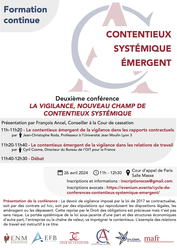
► Full Reference: La vigilance, nouveau champ de contentieux systémique (Vigilance, new field of Systemic Ligation), in cycle of conference-debates "Contentieux Systémique Émergent" ("Emerging Systemic Litigation"), organised on the initiative of the Cour d'appel de Paris (Paris Cour of Appeal), with the Cour de cassation (French Court of cassation), the Cour d'appel de Versailles (Versailles Court of Appeal), the École nationale de la magistrature - ENM (French National School for the Judiciary) and the École de formation des barreaux du ressort de la Cour d'appel de Paris - EFB (Paris Bar School), under the scientific direction of Marie-Anne Frison-Roche, 26 April 2024, 11am.-12.30am., Cour d'appel de Paris, Massé courtroom
____
🧮see the full programme of the cycle Contentieux Systémique Émergent (Emerging Systemic Litigation)
____
🌐see on LinkedIn the report of this event
____
🧱read below the report of this event⤵️
____
► Presentation of the conference: The duty of vigilance imposed by the 2017 French law is being contractualised, either by ad hoc contracts or by stipulations that reproduce the legal provisions, adjust them or go beyond them. This adoption by the Contract and Tort Law is valuable but not without risk. The systemic scope of the underlying law on the one hand and of economic structures on the other, the firm or the value chain, will permeate litigation. The example of labour relations is instructive in this respect.
____
🧮Programme of this event:
Second conference-debate
LA VIGILANCE, NOUVEAU CHAMP DE CONTENTIEUX SYSTÉMIQUE
(VIGILANCE, NEW FIELD OF SYSTEMIC LITIGATION)
Paris Court of Appeal, Massé courtroom
General presentation of the topic and moderation by 🕴️François Ancel, Judge at the Première Chambre civile de la Cour de cassation (First Civil Chamber of the French Court of cassation)
🕰️11am.-11.20am. 🎤Le contentieux émergent de la Vigilance dans les rapports contractuels (Emerging Vigilance Litigation in Contractual Relationships), by 🕴️Jean-Christophe Roda, Full Professor at Jean-Moulin Lyon 3 University
🕰️11.20am.-11.40am. 🎤Le contentieux émergent de la Vigilance dans les relations de travail (Emerging Vigilance Litigation in Employment Relationships), by 🕴️Cyril Cosme, Director of the French Office of the International Labour Organization (ILO)
🕰️11.40am.-12.30am. Debate
____
🔴Registrations and information requests can be sent to: inscriptionscse@gmail.com
🔴For the attorneys, registrations have to be sent to the following address: https://evenium.events/cycle-de-conferences-contentieux-systemique-emergent/
⚠️The conference-debates are held in person only, in the Cour d’appel de Paris (Paris Court of Appeal).
____
🧱read below a detailed presentation of this event⤵️
________
April 4, 2024
Publications
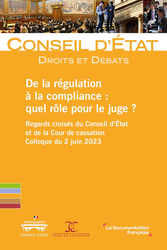
🌐follow Marie-Anne Frison-Roche on LinkedIn
🌐subscribe to the Newsletter MAFR Regulation, Compliance, Law
____
► Full Reference: M.-A. Frison-Roche, "Le rôle du juge dans le déploiement du droit de la régulation par le droit de la compliance" ("Synthesis: The role of the Judge in the deployment of Regulatory Law through Compliance Law"), Synthesis in Conseil d'État (French Council of State) and Cour de cassation (French Court of cassation), De la régulation à la compliance : quel rôle pour le juge ? Regards croisés du Conseil d'Etat et de la Cour de cassation - Colloque du 2 juin 2023, La Documentation française, "Droits et Débats" Serie, 2024, pp. 173-182
____
____
🚧read the bilingual Working Paper which is the basis of this article, with additional developments, technical references and hyperlinks
____
► Presentation of this concluding article: It is remarkable to note the unity of conception and practice between professionals who tend to work in administrative jurisdictions and professionals who tend to work in judicial jurisdictions: they all note, in similar terms, an essential movement: what Regulatory Law is, how it has been transformed into Compliance Law, and how in one and even more so in the other the Judge is at the centre of it.
Judges, as well as Regulators and European officials, explain this and use different examples to illustrate the far-reaching changes it brings to the Law and to the companies responsible for increasing the systemic effectiveness of the rules through the practice and dissemination of a Culture of Compliance.
The role of the judge participating in this Ex Ante transformation is renewed, whether he/she is a judge of Public Law or a judge of Private Law, in a greater unity of the legal system.
____
► English Summary of this article: The tug-of-war between 'Compliance' and 'conformity', which is exhausting us, obscures what is essential, i.e. the great novelty of a branch of law that assumes a humanist vision expressing the ambition to shape the future so that it is not catastrophic (preventing systems from collapsing), or even better (protecting human beings in these systems).
The article begins by describing the emergence of Compliance Law, as an extension of Regulatory Law and going beyond it. This new branch of law takes account of our new world, brings its benefits and seeks to counter these systemic dangers so that human beings could be their beneficiaries and are not crushed by them. This branch of Ex Ante Law is therefore political, often supported by public Authorities, such as Regulatory Authorities, but today it goes beyond sectors, as shown by its cutting edge, the Obligation of Vigilance.
The "Monumental Goals" in which Compliance Law is normatively anchored imply a teleological interpretation, leading to an "empowerment" of the crucial operators, not only States but also companies, responsible for the effectiveness of the many new Compliance Tools.
The article goes on to show that Judges are increasingly central to Compliance Law. Lawsuits are designed to make companies more accountable. In this transformation, the role of the judge is also to remain the guardian of the Rule of Law, both in the protection of the rights of the defence and in the protection of secrets. Efficiency is not what defines Compliance, which should not be reduced to a pure and simple method of efficiency, which would lead to being an instrument of dictatorship. This is why the principle of Proportionality is essential in the judge's review of the requirements arising from this so powerful branch of Law.
The courts are thus faced with a new type of dispute, of a systemic nature, in their own area, which must not be distorted: the Area of Justice.
____
📝read article (in French)
________
Feb. 26, 2024
Hearings by a Committee or Public organisation
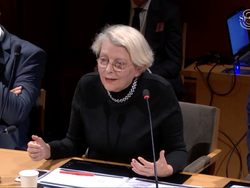
🌐suivre Marie-Anne Frison-Roche sur LinkedIn
🌐s'abonner à la Newsletter MAFR Regulation, Compliance, Law
____

► Référence complète : M.-A. Frison-Roche, "Le juge dans les contentieux de vigilance", participation à la "table ronde sur le devoir de vigilance", audition par la Commission d'enquête du Sénat sur les moyens mobilisés et mobilisables par l'État pour assurer la prise en compte et le respect par le groupe TotalEnergies des obligations climatiques et des orientations de la politique étrangère de la France, 26 février 2024, 16h-17h30
____
____
📺regarder en différé l'ensemble de la table ronde
____
📓lire le rapport de la commission d'enquête du Sénat
____
⚖️ Cette audition a été menée en considération de règles spécifiques à ma situation dans la mesure où d'une part le Droit interdit sous peine de sanction pénale à la personne convoquée de refuser de se présenter et ou d'autre part j'ai immédiatement rappelé au secrétariat de la Commission d'Enquête qu'ayant été Amica Curiae dans le litige opposant les associations Les Amis de la Terre et autres en demande et le groupe TotalEnergie en défense, l'objet du litige portant sur des manquements allégués d'obligations découlant de devoir de vigilance, le statut d'Amica Curiae a conduit pendant cette instance à ne pas connaître le dossier et à continuer de ne pas le connaître pendant une période raisonnable après l'audience du 26 octobre 2022 et le jugement du 28 février 2024 dans le cas dit "Total Ouganda", ce qui conduit nécessairement par application aux règles juridiques et de déontologie à ne pas répondre à certaines questions.
Dans le respect de ces contraintes, il est répondu le mieux possible pour éclairer la Commission d'Enquête.
Cette audition est à mettre en corrélation avec l'audition qui s'est déroulée devant la Commission ... de l'Assemblée Nationale ....
____
► Organisation de la Table Ronde : En accord avec le secrétariat de la Commission d'Enquête, et afin de rendre le plus fructueux possible le premier temps de cette table ronde ayant pour objet Le devoir de vigilance, dans la mesure où il apparaît que dans l'ensemble des auditions programmées, c'est sans doute là où se concentre le plus l'expertise juridique, les 4 intervenants se sont préalablement réunis pour éviter le double écueil soit de traiter deux fois la même chose soit de laisse une dimension du sujet non traité.
Ainsi la première intervenante traite de la façon dont les entreprises élaborent les plans de vigilance, le deuxième intervenant développe la façon dont elles intègrent leur devoir de vigilance dans leur déploiement international, notamment par des mécanismes contractuels, le troisième intervenant expose ce que, dans les contentieux, les demandeurs (qui sont souvent des ONG) allèguent, ce qui m'a conduit en dernier lieu à exposer ce qu'il en est de l'office du juge en la matière.
Il en résulte que mon intervention de 8 minutes aborde plus particulièrement de la question de l'office du juge dans la mise en application du devoir de vigilance.
____
🔲consulter les slides servant de support à cette intervention
____
► Présentation de l'intervention préliminaire : En premier lieu, j'ai souligné qu'en l'état du droit positif, le droit français repose sur le juge puisque la loi pose une Obligation de Vigilance, qui est à la fois une obligation générale et de moyens, l'entreprise devant montrer qu'elle fait ses "meilleurs efforts", cette obligation générale, qui n'est pas limitée à l'environnement, étant déclinée d'une façon particulière par l'entreprise en fonction de ses risques particuliers et de ses engagements propres, notamment contractuels, tandis que le juge applique ce système au cas par cas.
La loi de 2017 a voulu confier ce pouvoir au juge et a voulu un système simple en donnant la seule compétence au seul Tribunal Judiciaire de Paris, ce qui permet d'obtenir une interprétation jurisprudentielle, aussi bien sur les questions procédurales et substantielles, immédiatement unifiée, le dialogue des juges devant être toujours favorisé, tandis que la spécialisation et la formation de ces juges étant un enjeu auquel les juridictions ont répondu concrètement, la Cour d'appel de Paris ayant mis en place une chambre spécialisée, tandis qu'une formation spécialisée sur ces "contentieux systémiques émergents" d'un type nouveau se met en place. Cette spécialisation rend moins impérieuse l'établissement d'une Autorité administrative de supervision.
Cette présence du juge ne doit pas être présentée ni perçue comme pathologique car le procès de vigilance est dans l'ordre des choses, les parties prenantes trouvant une voie d'expression : d'une part plus les entreprises développeront en amont le dialogue et moins il y aura de contentieux et d'autre part le procès lui-même, en continuum, doit favoriser ce dialogue, par le contradictoire et par la médiation.. C'est une part essentielle de l'office du juge qui doit aussi faire respecter le Droit et apporter des solutions à ces enjeux systémiques, la remédiation (plutôt que trancher et sanctionner) étant une voie de son office à développer.
Parce que les juridictions concernées ont su ajuster leur organisation interne et les juges adapter leur office, la généralité de la loi de 2017 permettant précisément cela, la question de l'adoption ou de la non-adoption de la directive CS3D n'étant de ce fait pas un enjeu dramatique parce que le juge est déjà au centre de la vigilance, il convient plutôt de laisser le temps que l'oeuvre de jurisprudence se fasse.
________
Feb. 8, 2024
Thesaurus : Doctrine
► Référence complète : I. Grossi, "Du nouveau sur les contours du devoir de vigilance", La lettre juridique, n° 973, 8 février 2024
____
► Résumé de l'article (fait par l'auteur) : "Le tribunal judiciaire de Paris a eu l’occasion de se prononcer pour la première fois, au fond, dans un jugement didactique et équilibré, en matière de plan de vigilance. Selon lui, le plan de vigilance de la société La Poste doit être complété par des mesures concrètes, adéquates et efficaces en cohérence avec la cartographie des risques. Le tribunal ne va cependant pas jusqu’à décider à sa place de la mesure la plus appropriée.".
____
🦉Cet article est accessible en texte intégral pour les personnes inscrites aux enseignements de la Professeure Marie-Anne Frison-Roche
________